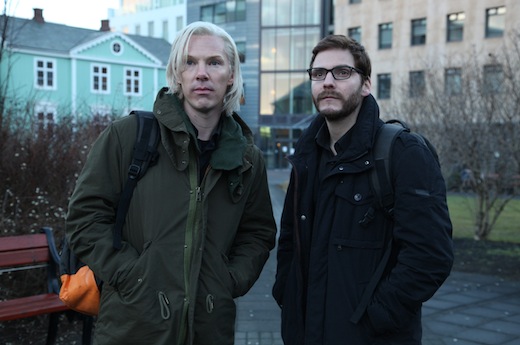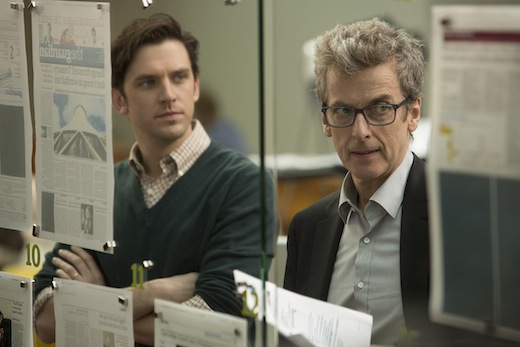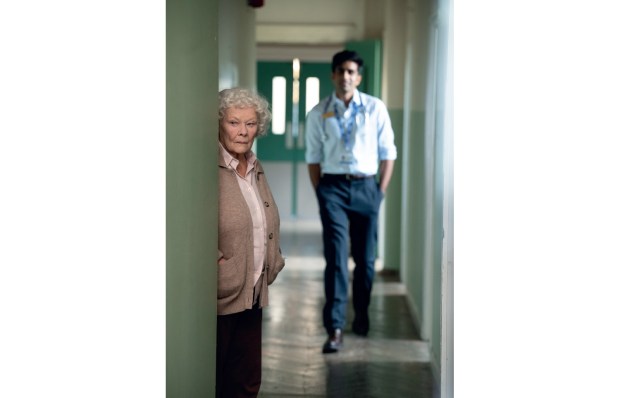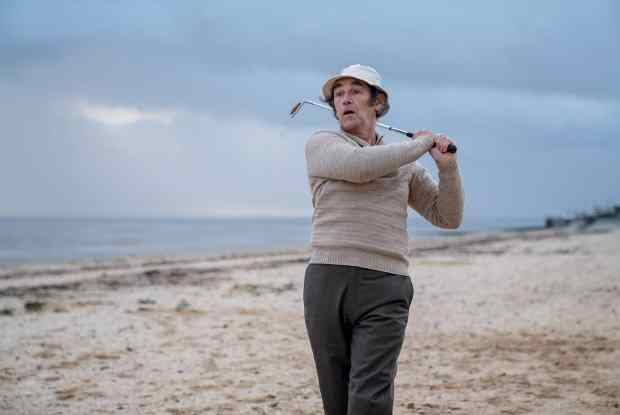Just how interesting you find The Fifth Estate may entirely depend on how interested you are in the whistle-blowing site WikiLeaks and its founder Julian Assange, in the first instance. This does not do what Senna did, for example, or what The Social Network did, and grip you in the places you didn’t know you could be gripped with a subject matter you’d no idea could be gripping. It’s not like that and I’ll tell you for why, in bullet points, because I’m just in a bullet-y mood today, and if you don’t use your bullet points — we are all allocated a certain amount at birth — they will start to atrophy and rot. So here we are:
* This isn’t dramatically exciting as so much of the action happens in the form of men with worried brows tapping away on laptops, or wandering around airports, and watching someone wander around an airport is like wandering around an airport yourself; so mind-killingly boring you actually think it might be a good idea to buy a Mont Blanc pen, or even pay £10 to enter a competition and probably not win a sports car.
* It assumes knowledge, particularly technical knowledge — what are these ‘servers’ they speak of? Why are they critical? — then attempts to rectify this by inserting clunky chunks of exposition that will lose you anyhow.
* It never conveys why, if we are not much interested, we should be interested, or why any of this should exercise us as it does the Guardian, which gets very exercised indeed.
* Benedict Cumberbatch’s performance as Assange is obviously the highlight, but he can’t hold this together as a ‘performance film’ in the way Meryl Streep held together The Iron Lady, or Colin Firth held together The King’s Speech, because Assange remains opaque, and we don’t learn anything about him beyond what we know already, which is that he is the sort of person who falls out with everybody and will one day probably fall out with himself. (He’ll stop taking his own calls, although if he were to visit himself in the Ecuadorian embassy, how he will pretend to be out I just don’t know.)
 Julian Assange (Cumberbatch) and Daniel Berg (Bruhl)
Julian Assange (Cumberbatch) and Daniel Berg (Bruhl)
Now I’ve used my bullets, which is good — I think they were right on the verge of rotting — I’ll go back to normal. OK, so this tries to tell the WikiLeaks story through Assange’s relationship with Daniel Berg (Daniel Brühl), his right-hand man in the run-up to the 2010 release of the ‘Iraq war logs’. Daniel is a programmer who first meets Assange at a hacker conference, and Daniel is in thrall. He believes in Assange as a great political activist, and also believes he sits atop a vast team of volunteers sifting through information when the truth is, as he later discovers, it’s just Julian with different email addresses (cheeky!). Those in the know say Cumberbatch’s performance captures the physical Assange perfectly — his creepiness, the tongue lolling, his twitchiness, his way of appraising every room as if he owns it — but the film fails to get a handle on him as a personality, or offer any kind of insight into what his true motivation might be. There are occasional glimpses into his background — his weird upbringing; the fact he has a son — but it’s always too little, too late, and clumsy. Plus the script contains lines like: ‘He [Assange] has to reveal secrets because he has so many of his own…’ Really. It does.
 Guardian journalists Ian Katz (Dan Stevens) and Alan Rusbridger (Peter Capaldi)
Guardian journalists Ian Katz (Dan Stevens) and Alan Rusbridger (Peter Capaldi)
As directed by Bill Condon, there are whizzy visuals showing the frantic spread of information in the internet age, but, still, it is all horribly inert. It comes in at two hours and at the halfway mark, when Daniel still hadn’t done anything bar tap away at his laptop while ignoring his girlfriend (Alicia Vikander, in a deeply thankless role), I wanted to get a broom handle or something and just thrash the whole thing into some kind of life. Maybe it’s because the screenplay never takes a position, so there is no sense of a journey, or even much clarity, and as to Assange’s relationship with the press, and who used whom, I’m also none the wiser. Still, the casting of Guardian journalists makes for some amusing fun, with Dan Stevens playing Ian Katz, then the Guardian’s deputy editor and now editor of Newsnight, and whom I have never met, but wish I had, as he must be a total dish. For all I know, it may even be that Dan Stevens is not hot enough!
So, a film which fails to get a grip on its own source materials, ironically enough, and probably fails to lead us through all the moral complexities, particularly when it comes to protecting whistle-blowers at the expense of those named in documents. But, not a total waste of time, as I did get to ditch quite a few bullets, which is always a relief. Phew.
Got something to add? Join the discussion and comment below.
Get 10 issues for just $10
Subscribe to The Spectator Australia today for the next 10 magazine issues, plus full online access, for just $10.
You might disagree with half of it, but you’ll enjoy reading all of it. Try your first month for free, then just $2 a week for the remainder of your first year.













Comments
Don't miss out
Join the conversation with other Spectator Australia readers. Subscribe to leave a comment.
SUBSCRIBEAlready a subscriber? Log in